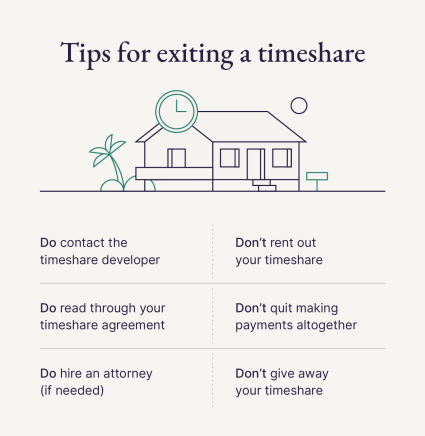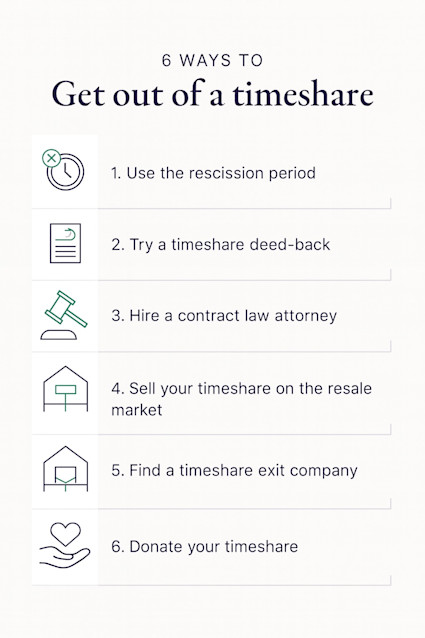| Key takeaways |
|---|
| Getting out of a timeshare is a notoriously difficult process that can quickly eat up your time and money. Read our guide to learn the top six strategies for how to get out of a timeshare, the average cost to get out of a timeshare for each, and who would likely benefit most from each method. |
Menu
- How do you get out of a timeshare using the timeshare rescission period?
- What is a timeshare deed-back program, and how does it work?
- How do you sell your timeshare on the resale market?
- How does a timeshare exit company work?
- What does donating your timeshare look like?
- When should I hire a contract law attorney?
- What are some dos and don’ts when exiting a timeshare?
- How does Pacaso compare to a timeshare?
1. Use the timeshare rescission period
For those who just bought a timeshareCost: less than a dollarA rescission period is a short period of time you’re allowed to change your mind and walk away without incurring a fee. It varies state by state (where the timeshare is located, not where you live), but state rescission periods are usually between three and 15 days.To take advantage of the rescission period, you’ll need to write a letter to the timeshare developers with the following information:- The names on the signed agreement
- The name of the timeshare developer
- Cancellation address of the resort
- Today's date
- The purchase date
- The agreement contract number
- The amount of the original purchase price
- A statement declaring your cancellation
- Your contact information, including mailing address, phone number and email

2. Try a timeshare deed-back
For timeshare agreements with a buyback programCost: free to a few hundred dollars A timeshare deed-back program, also known as a buyback program, is when the timeshare company buys your timeshare back from you. It’s a legal, low-cost way to give the property back to the resort.However, not all resorts and timeshare developers offer this option, and you may have to be in good standing with the resort to qualify for the program. Even if this option is available, sometimes only major life events like job loss or death qualify. Before pursuing this option, check your contract to learn how your timeshare works and search for stipulations about your developer’s deed-back program.Examples of deed-back programs include:- Wyndham Destinations (through their "Ovation" program)
- Marriott Vacation Club, Sheraton Vacation Club, Westin Vacation Club
- Holiday Inn Club Vacations (through "Horizons" program)
- Hyatt Vacation Club
- Westgate Resorts (through "The Westgate Legacy Program")
3. Sell your timeshare on the resale market
For those who paid off their timeshare loanCost: $300 to $700 for closing costsIf your rescission period has expired and your timeshare developer doesn’t offer a buyback program, take matters into your own hands by selling your timeshare on the resale market.Keep in mind that this option may only apply to those who have completely paid off their timeshare. Timeshares still tied to loans will be listed as “encumbered.”Here is a step-by-step process for how to get rid of a timeshare that’s paid off:- Check if your purchase agreement allows you to sell directly to a new owner or if your timeshare developer has first dibs on buybacks via a "right of first refusal" (ROFR) clause.
- If it is eligible for resale, find out how much it’s worth by looking at the price of timeshare listings similar to yours. Pay close attention to similar locations, square footage and amenities.
- List your timeshare on an online resale website like RedWeek, and beware of companies that charge hefty fees to list on “exclusive” websites.
- Online marketplaces
- Licensed timeshare resale brokers
- General online classifieds
4. Find a timeshare exit company
For those who want to skip the headacheCost: $2,000 to $15,000+A timeshare exit company is a last resort for owners asking the increasingly common question, “How do you get out of a timeshare?” If other methods are unavailable to you, you should consider working with a company that specializes in complicated timeshare exit procedures.Unfortunately, there are many timeshare exit company scams on the internet, so here are a few tips for how to find a legitimate contender:- Search for a company with a proven track record. Check their website to see how many years they’ve been in business and if they have testimonials.
- Check third-party reviews. Search for the company name on business review platforms like Yelp to see if there are any customer reviews.
- Avoid companies that ask for payment upfront. This is a red flag that the company is potentially a scam.
5. Donate your timeshare
For timeshares that are fully paid offCost: Varies depending on maintenance, transfer fees, and appraisal costsDonating your timeshare to charity seems like an easy way out of those rising fees, and you might even get a tax write-off. But it's not free. You'll still pay maintenance fees, taxes, and transfer costs until the charity officially owns it. If you want a big tax deduction, you'll also have to pay for an appraisal. Some charities might even ask for a cash donation to help cover their future expenses.Examples of where to donate your timeshare include:- Specialized timeshare donation services
- Direct contact with individual charities
6. Hire a contract law attorney
For timeshares with multiple contractsCost: $5,000 to $15,000+Although it’s one of the most expensive options, hiring a timeshare lawyer (aka a contract law attorney) is a must for timeshare owners tangled in multiple contracts.These legal professionals help you get out of a timeshare legally by combing through your timeshare agreement(s) for loopholes like the rescission period and deed-back programs.If you try to negotiate these terms on your own, a timeshare developer may try to sway you by offering “free” upgrades if you keep your timeshare. However, each upgrade can generate a new contract that further complicates the exiting procedure. A contract law attorney can help you make sense of these contracts and mitigate the costs of exiting.Recap: what are the six timeshare exit strategies?
To summarize, here’s a breakdown of each of the six timeshare exit strategies and their associated costs, pros, cons, and who would benefit from each.| Solution | Cost | Description | Advantage | Disadvantage | Beneficiary |
| Rescission period | Free | Typically 3-15 days, allowing you to cancel the contract without penalty right after purchase. | Full refund of any money paid. | Very short window; often missed. | For those who just bought a timeshare |
| Timeshare deed-back | Free to a few hundred dollars | Releases you from ownership and often requires the timeshare to be paid off. | Can be a legitimate and free way to exit if the resort offers it. | Not all resorts offer this option. | For timeshare agreements with a buyback program |
| Resale market | $300-$700 | Listing your timeshare for sale through a licensed real estate broker specializing in timeshares or on online marketplaces. | Potential to recoup some of your initial investment. | Highly competitive market. | For those who paid off their timeshare loan |
| Timeshare exit company | $2,000 - $10,000+ | Companies to help you cancel your timeshare contract. | May offer a solution if other methods fail. | High prevalence of scams in this industry. | For those who want to skip the headache |
| Donating the property | Varied cost | Transferring ownership of your timeshare to a charity or non-profit organization. | Can provide a tax deduction (consult a tax professional). | Many charities no longer accept timeshares due to the ongoing liabilities. | For timeshares that are fully paid off |
| Contract law attorney | $5,000 - $15,000+ | Hiring a lawyer specializing in contract law or timeshare disputes to review your contract and pursue legal cancellation. | Provides legitimate legal recourse. | Success is not guaranteed, and litigation can be lengthy. | For timeshares with multiple contracts |
What are the dos and don'ts when exiting a timeshare?

- Do contact the timeshare developer. See if you are still within the rescission period or if your developer offers a buyback program that you qualify for.
- Do read through your timeshare agreement. You may find helpful information that can help you craft your exit strategy.
- Do hire an attorney (if needed). If the low-cost options don’t work or if your timeshare is bound by multiple contracts, a lawyer can take care of the details.
- Don’t rent out your timeshare. Many timeshare developers don’t allow this, and you will still be responsible for any maintenance fees.
- Don’t give away your timeshare. Although this may seem like a win-win situation, it may not be legal, and you could still be responsible for maintenance fees and any future issues due to your contract.
- Don’t quit making payments altogether. For obvious reasons, the timeshare developers could take legal action against you if you quit paying your timeshare fees.

Pacaso vs. timeshare: which one is best for me?
If you want to avoid the hassles of a timeshare altogether, or you simply want a better way to enjoy a vacation property — co-ownership with Pacaso offers a refreshing alternative to timeshares. While timeshares typically limit you to a small slice of use and provide no real equity, Pacaso gives you true ownership of a luxury second home, not just vacation-time rights.With Pacaso, each home is co-owned by a small group of up to eight buyers through a professionally managed LLC. That means more privacy, more flexibility in scheduling, and significantly more time in the home than the one-week model common in timeshares. And because your ownership is tied to real property, your share can appreciate over time — offering potential financial upside instead of the depreciation many timeshare owners face.Pacaso also handles the heavy lifting: design, furnishing, maintenance, repairs, bill management, and cleaning. So you get all the enjoyment of a second home without the hassle of managing it. And if your needs change, Pacaso provides a streamlined resale process that makes it easier to sell your share compared to the notoriously difficult timeshare resale market.If you want the comfort of a beautifully maintained home, the benefits of real estate ownership, and a simple, stress-free way to make the most of your time away, Pacaso delivers a smarter, more flexible alternative to traditional timeshares.How to get out of a timeshare FAQ
01: What is the average cost to get out of a timeshare?
The cost to exit a timeshare varies significantly, ranging from a few hundred dollars for simple methods like using the rescission period to potentially over $15,000 if you need to hire a lawyer for complex cases or utilize certain exit companies. Factors influencing the cost include whether you still owe a mortgage, the specific resort's policies and the chosen exit method.
02: Can you get out of a timeshare without a lawyer?
Yes, it's possible to get out of a timeshare without a lawyer, especially if you act quickly during the rescission period defined in your contract. Other non-legal options include trying to sell it (often at a significant loss), exploring deed-back programs with the resort, or even attempting to give it away for free.
03: Can I sell my timeshare back to the resort?
Yes, some resorts offer "deed-back" or "buyback" programs, allowing owners to return their timeshare. However, these programs usually don't involve the resort paying you for the timeshare; instead, they release you from future financial obligations like maintenance fees.
04: Why is it so hard to sell a timeshare?
Selling a timeshare is notoriously difficult due to an oversaturated resale market with far more sellers than buyers. Additionally, timeshares typically depreciate significantly in value and come with ongoing, often increasing, maintenance fees that deter potential new owners.
05: How can I avoid being scammed by timeshare exit companies?
To avoid timeshare exit scams, thoroughly research any company by checking their Better Business Bureau rating, online reviews and verifying their legitimate business practices. Be wary of upfront fees, guaranteed exits or high-pressure sales tactics, and never pay for services before they are rendered.
06: What is the cheapest way to get out of a timeshare?
Using the rescission period is typically the most cost-effective method — it usually costs nothing more than a postage stamp.
07: What is the most common way to exit a timeshare?
Many owners work directly with the timeshare developer or hire a timeshare exit company, depending on the complexity of the contract.
08: What is a timeshare rescission period?
A rescission period is a short window of time during which you can change your mind and cancel your timeshare without a penalty. It varies by state — usually between 3 and 15 days — based on the location of the property.
09: How long does it take to get out of a timeshare?
It can be as quick as 3–15 days if you use the rescission period. More complex situations, especially those requiring a contract attorney, may take longer.
010: Can I rent out my timeshare instead of canceling?
11: Is hiring a timeshare exit company worth it?
For complicated contracts or if you want to avoid back-and-forth negotiations with the developer, a timeshare exit company can be worthwhile. Costs range from $2,000 to $15,000+ depending on your situation, but it may save you significant time and stress.
12: What are the main benefits of Pacaso over a timeshare?
Pacaso offers true fractional ownership of luxury homes, with a small group of up to eight co-owners. Benefits include:
- More flexibility & privacy: Schedule stays without the rigid restrictions of timeshare weeks.
- Potential financial upside: Ownership shares can appreciate, unlike timeshares which typically lose value.
- Hassle-free management: Pacaso handles furnishing, maintenance, bills, and cleaning.
- Streamlined resale: If your needs change, Pacaso offers an easier path to sell your share compared to the often challenging timeshare resale market.










